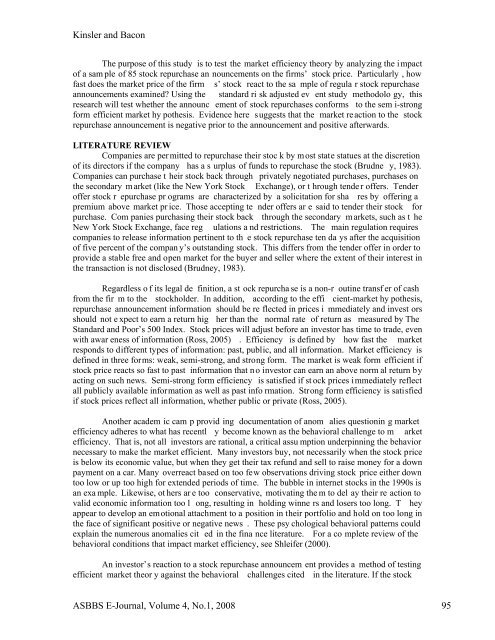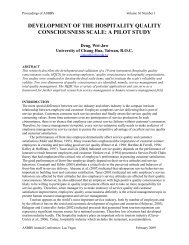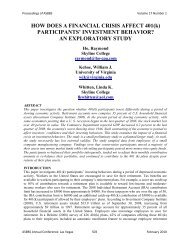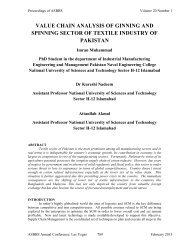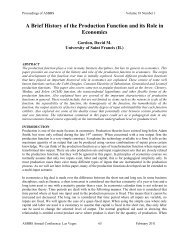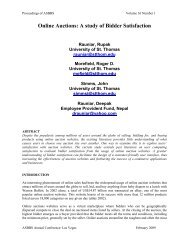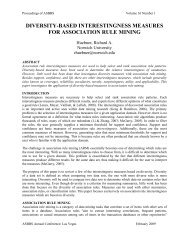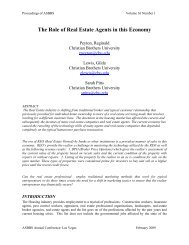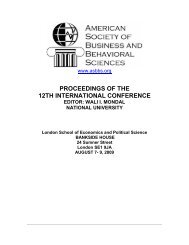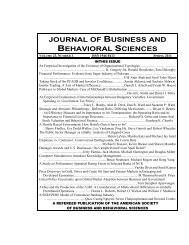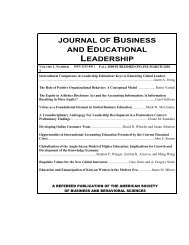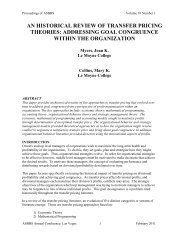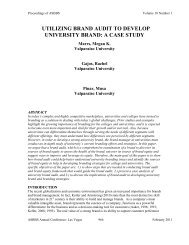stock repurchase announcements: a test of market ... - Asbbs.org
stock repurchase announcements: a test of market ... - Asbbs.org
stock repurchase announcements: a test of market ... - Asbbs.org
Create successful ePaper yourself
Turn your PDF publications into a flip-book with our unique Google optimized e-Paper software.
Kinsler and Bacon<br />
The purpose <strong>of</strong> this study is to <strong>test</strong> the <strong>market</strong> efficiency theory by analyzing the impact<br />
<strong>of</strong> a sam ple <strong>of</strong> 85 <strong>stock</strong> <strong>repurchase</strong> an nouncements on the firms’ <strong>stock</strong> price. Particularly , how<br />
fast does the <strong>market</strong> price <strong>of</strong> the firm s’ <strong>stock</strong> react to the sa mple <strong>of</strong> regula r <strong>stock</strong> <strong>repurchase</strong><br />
<strong>announcements</strong> examined? Using the standard ri sk adjusted ev ent study methodolo gy, this<br />
research will <strong>test</strong> whether the announc ement <strong>of</strong> <strong>stock</strong> <strong>repurchase</strong>s conforms to the sem i-strong<br />
form efficient <strong>market</strong> hy pothesis. Evidence here suggests that the <strong>market</strong> reaction to the <strong>stock</strong><br />
<strong>repurchase</strong> announcement is negative prior to the announcement and positive afterwards.<br />
LITERATURE REVIEW<br />
Companies are per mitted to <strong>repurchase</strong> their stoc k by most state statues at the discretion<br />
<strong>of</strong> its directors if the company has a s urplus <strong>of</strong> funds to <strong>repurchase</strong> the <strong>stock</strong> (Brudne y, 1983).<br />
Companies can purchase t heir <strong>stock</strong> back through privately negotiated purchases, purchases on<br />
the secondary m arket (like the New York Stock Exchange), or t hrough tende r <strong>of</strong>fers. Tender<br />
<strong>of</strong>fer <strong>stock</strong> r epurchase pr ograms are characterized by a solicitation for sha res by <strong>of</strong>fering a<br />
premium above <strong>market</strong> pr ice. Those accepting te nder <strong>of</strong>fers ar e said to tender their <strong>stock</strong> for<br />
purchase. Com panies purchasing their <strong>stock</strong> back through the secondary m arkets, such as t he<br />
New York Stock Exchange, face reg ulations a nd restrictions. The main regulation requires<br />
companies to release information pertinent to th e <strong>stock</strong> <strong>repurchase</strong> ten da ys after the acquisition<br />
<strong>of</strong> five percent <strong>of</strong> the compan y’s outstanding <strong>stock</strong>. This differs from the tender <strong>of</strong>fer in order to<br />
provide a stable free and open <strong>market</strong> for the buyer and seller where the extent <strong>of</strong> their interest in<br />
the transaction is not disclosed (Brudney, 1983).<br />
Regardless o f its legal de finition, a st ock repurcha se is a non-r outine transf er <strong>of</strong> cash<br />
from the fir m to the <strong>stock</strong>holder. In addition, according to the effi cient-<strong>market</strong> hy pothesis,<br />
<strong>repurchase</strong> announcement information should be re flected in prices i mmediately and invest ors<br />
should not e xpect to earn a return hig her than the normal rate <strong>of</strong> return as measured by The<br />
Standard and Poor’s 500 Index. Stock prices will adjust before an investor has time to trade, even<br />
with awar eness <strong>of</strong> information (Ross, 2005) . Efficiency is defined by how fast the <strong>market</strong><br />
responds to different types <strong>of</strong> information: past, public, and all information. Market efficiency is<br />
defined in three forms: weak, semi-strong, and strong form. The <strong>market</strong> is weak form efficient if<br />
<strong>stock</strong> price reacts so fast to past information that n o investor can earn an above norm al return by<br />
acting on such news. Semi-strong form efficiency is satisfied if st ock prices immediately reflect<br />
all publicly available information as well as past info rmation. Strong form efficiency is satisfied<br />
if <strong>stock</strong> prices reflect all information, whether public or private (Ross, 2005).<br />
Another academ ic cam p provid ing documentation <strong>of</strong> anom alies questionin g <strong>market</strong><br />
efficiency adheres to what has recentl y become known as the behavioral challenge to m arket<br />
efficiency. That is, not all investors are rational, a critical assu mption underpinning the behavior<br />
necessary to make the <strong>market</strong> efficient. Many investors buy, not necessarily when the <strong>stock</strong> price<br />
is below its economic value, but when they get their tax refund and sell to raise money for a down<br />
payment on a car. Many overreact based on too few observations driving <strong>stock</strong> price either down<br />
too low or up too high for extended periods <strong>of</strong> time. The bubble in internet <strong>stock</strong>s in the 1990s is<br />
an exa mple. Likewise, ot hers ar e too conservative, motivating the m to del ay their re action to<br />
valid economic information too l ong, resulting in holding winne rs and losers too long. T hey<br />
appear to develop an emotional attachment to a position in their portfolio and hold on too long in<br />
the face <strong>of</strong> significant positive or negative news . These psy chological behavioral patterns could<br />
explain the numerous anomalies cit ed in the fina nce literature. For a co mplete review <strong>of</strong> the<br />
behavioral conditions that impact <strong>market</strong> efficiency, see Shleifer (2000).<br />
An investor’s reaction to a <strong>stock</strong> <strong>repurchase</strong> announcem ent provides a method <strong>of</strong> <strong>test</strong>ing<br />
efficient <strong>market</strong> theor y against the behavioral challenges cited in the literature. If the <strong>stock</strong><br />
ASBBS E-Journal, Volume 4, No.1, 2008 95


